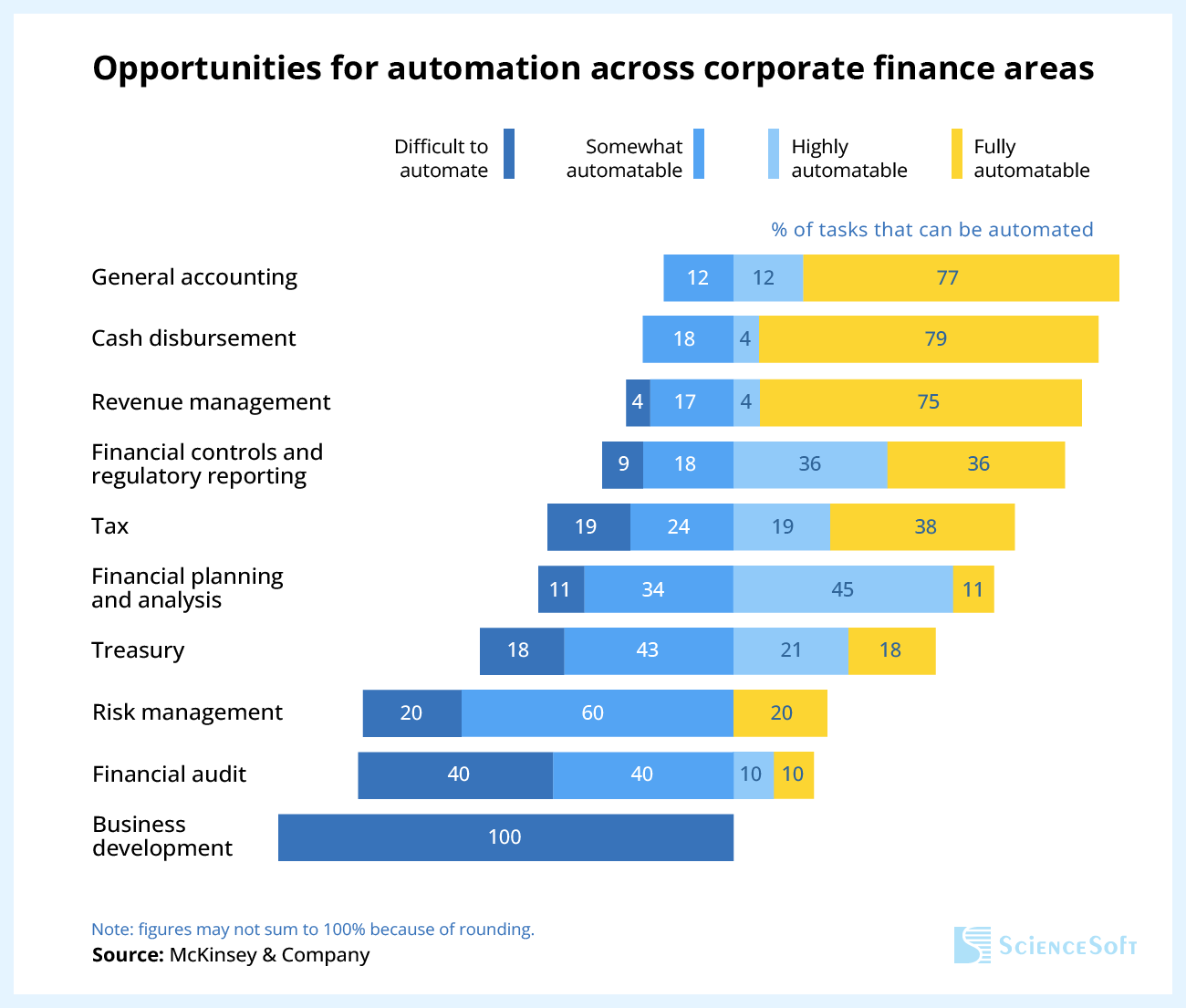Digital Transformation in Corporate Finance
Strategy, Costs, Techs, Skills
In corporate finance IT since 2007, ScienceSoft provides full-cycle services to help companies digitally transform their financial management processes.
Digitalization in Finance: Summary
Digitalization in finance aims to transform the corporate finance processes with the help of modern tools and advanced technologies like AI, big data, blockchain. It eliminates up to 90% of manual finance-related tasks, driving faster, more accurate, and cost-effective financial workflows.
|
|
|
|
|
Key project steps: business analysis and requirements engineering, finance digitalization planning, a feasibility study, PoC development, modernization of the existing financial software and IT infrastructure, developing new financial solutions, integration, quality assurance, and user training. Timelines: 15–30 months on average. Cost: $700,000–$5,000,000+, depending on the project complexity. Team: a business analyst/a digital transformation consultant, a project manager, a solution architect, a UX/UI designer, a DevOps engineer, a front-end developer, a back-end developer, a data scientist, a QA engineer. |
|
|
|
With a full-scale PMO and experience in large-scale digitalization projects for Fortune 500 businesses, ScienceSoft knows how to help companies reimagine and smoothly transform their financial processes. The value of our forward-thinking approach to digital transformation engagements is recognized by IAOP, who has been naming ScienceSoft to its Global Outsourcing 100 list for four consecutive years.
Why It’s High Time to Transform Corporate Finance
According to Gartner, 80% of finance leaders believe the pace of digitalization in finance will accelerate in the next few years, and 69% say they are currently leading their corporate finance processes through digital transformation.
Although basic automation technologies like RPA have been around for some years, the maturing fintech environment and the proliferation of new operating models open a new frontier for corporate finance automation, bringing the benefits of faster, more accurate, cost-effective, and controllable financial processes. Based on Accenture’s findings, automation of transactional work alone helps achieve up to a 50% reduction in operational expenses and a 50–60% increase in teamwork efficiency.
Yet, organizations need a long-term digitalization strategy and specific digital competencies to support coherent finance transformation efforts. Gartner notes that over 70% of finance leaders admit facing challenges across both aspects.
Despite the substantial investments and preparatory efforts, digital transformation in finance promises a compelling payback. When implemented appropriately, the end-to-end financial process automation may bring 200–290% annual ROI.
Corporate Finance Areas to Digitalize
The potential for digitalization and the resulting benefits vary for each finance subfunction. According to McKinsey, 61% of financial operations are highly automatable, with 100% of general accounting and cash disbursement tasks being at least somewhat automatable.

ScienceSoft’s experience shows that digital transformation in finance brings particularly lucrative benefits across the following core financial management areas:
Automate up to 90% of accounting-related routines, boost the team’s productivity by 80%+, and make the accounting process up to 25x faster. Harness the power of blockchain to get an immutable record of financial transactions and ensure world-class security of your data.
Drive up to 90% cost savings per invoice due to fully automated invoice generation and processing. Get end-to-end visibility of the due and received payments to timely trigger collection procedures, achieve up to 2x reduction in DSO, and prevent revenue leakage.
Enjoy automated revenue reconciliation and simplify revenue recognition compliance with up-to-date accounting standards (ASC 606, IFRS 15, etc.). Speed up revenue close by up to 40% and ensure accurate revenue reporting.
Tax management
Avoid the risk of erroneous tax filings and accelerate tax reporting cycle time by up to 25% with full automation of your tax-related activities, from tax calculation and payment to tax filing and submission.
Enhance the team’s productivity by 75%+ due to automated aggregation and processing of treasury transactions. Get a real-time view of all operational, investment, and financing activities. Reduce the idle cash by up to 50% and ensure high-ROI investments with minimized financial risks due to AI-based guidance on optimal treasury decisions.
Financial planning and analysis
Turn your corporate finance into a value driver for the entire business with the paramount capabilities of AI-based big data analytics. Model and analyze finance up to 100x faster, forecast financial outcomes with 90%+ accuracy, and increase the company’s overall profitability with data-driven decisions on financial and strategic transactions.
A Roadmap to the Successful Digital Transformation of Finance
Below, ScienceSoft describes the key steps of a digitalization project and shares best practices to maximize the ROI for financial management revamp. Note that our roadmap is not a go-to action plan: in our projects, we always design an individual digitalization strategy and a launch a tailored plan for each client.
01
Business analysis and requirements engineering
To plan the digitalization of finance with a complete insight into the client’s financial management pains and needs, ScienceSoft’s consultants:
- Examine the client’s overall business situation and strategic business goals.
- Analyze the client’s financial management operations, including in the context of other business processes (e.g., HR management, operations management, supply chain management).
- Conduct a SWOT analysis of the existing financial software.
- Assess the complexity of the financial analytics the company currently relies on.
- Analyze regulatory compliance requirements, e.g., GAAP, IFRS, SOC1 and SOC2, SOX, PCI DSS, GDPR (for the EU), ZATCA rules (for Saudi Arabia).
Based on the analysis results, we introduce a detailed requirements specification for the financial management digitalization, which comprises:
- The finance areas that digital transformation should cover.
- Requirements for the modification of the existing financial software (if applicable), for example, migration to the cloud, rearchitecting or refactoring.
- Requirements for the functional capabilities that new corporate finance software should provide.
- Non-functional requirements for the digital finance solution: performance, availability, scalability, security, etc.
- The types of data the software should be able to process (financial data, asset data, supplier and customer data, etc.).
- Role-specific requirements for employee experiences.
02
Finance digitalization strategy and tactics planning
At this stage, ScienceSoft’s team forms a high-level vision of your corporate finance digitalization and introduces a detailed action plan to turn the digitalization initiatives into reality. It includes:
1. Determining long-term digitalization goals and short-term objectives.
2. Creating a custom digital transformation strategy with a company’s financial management goals in mind.
3. Designing the new financial software and/or redesigning the existing financial solutions. This step may include:
- Feature road-mapping – preparing a detailed list of features for the digital finance solution and prioritizing them based on the cost-benefit analysis.
-
Architecture (re)design – designing a secure, scalable, high-performing architecture for the corporate finance solution.
-
Integrations planning – preparing a plan of financial software integrations with relevant corporate solutions (e.g., operations management software, HRMS, vendor portal, asset management software) and external systems (bank accounts, financial data marketplaces, etc.).
-
UX and UI (re)design – designing role-specific UX and UI (e.g., for accountants, treasurers, financial data analysts, etc.) and introducing UI mockups.
4. Selecting a pragmatic tech stack.
ScienceSoft’s best practice: We employ proven frameworks, ready-to-use app components (e.g., OOTB logic components, banking APIs, deployment scripts) where possible. This helps streamline financial software development, ensure high quality of the solution, and optimize the project budget.
5. Planning the project: task scope, timelines and budget, team, and KPIs.
6. Introducing a risk mitigation plan that covers such risks as operational complexity, financial data leakage, non-compliance with sectoral regulations, project cost and time overruns.
User adoption remains the key factor defining the success of digital transformation. ScienceSoft takes great care of encouraging your team to shift to the new tech-driven workflows. Already at the planning stage, we prioritize the initiatives that bring prompt and clear improvements to the regular finance-related tasks, thus showing the innovations in an appealing light.
03
Feasibility study and proof of concept delivery
ScienceSoft estimates the TCO and ROI for each digitalization initiative and analyzes the economic feasibility of transformations. Additionally, we can develop a proof of concept to assess the viability of an innovative finance solution.
04
Implementing finance digitalization steps
At this stage, ScienceSoft’s team gradually implements the planned initiatives. Particularly, we may:
- Advance the existing IT infrastructure:
- Perform cloud migration.
- Establish DevOps: cloud automation, CI/CD pipelines, and container orchestration.
- Implement modern infrastructure security mechanisms, e.g., AI-powered XDR and deception tools.
- Develop new corporate finance software and/or modernize the existing financial management solutions.
ScienceSoft’s best practice: We develop financial software iteratively to introduce the fundamental functions first and drive faster payback from digitalization.
- Run quality assurance procedures in parallel with development and fix the discovered defects.
- Deploy financial software to the production environment.
- Integrate the software with the required internal and third-party systems.
- Introduce financial analytics (this may require designing, training, and tuning machine-learning-based data analytics models).
- Implement security policies, procedures, and controls.
Additionally, we can provide after-launch support of the delivered financial software and upgrade it with new functionality when needed.
Due to being complex and long-running, finance digitalization projects demand flexibility. For example, it may turn out that the digitalization strategy requires some tuning at the implementation stage due to the altering business situation. When this happens, we help our clients promptly tune the strategy and the implementation plan without causing any negative impact on the project flow and the outcomes.
05
Employee training
Upon the implementation of each particular digitalization initiative, ScienceSoft designs a dedicated training program and conducts employee training in a company's preferred format (remote, onsite, or hybrid). This helps the finance team quickly learn how to apply the innovations and improve their daily operations.
Additionally, we can draw up user documents (manuals, how-to guides, and self-training materials) and share them with the client’s IT team.
Consider Professional Services for Digitalization in Finance
With 36 years of experience in IT and 18 years in creating digital financial management solutions, ScienceSoft can provide:
What Makes ScienceSoft a Reliable Finance Digitalization Partner
Achieving project goals in spite of time and budget constraints, as well as changing requirements, is ScienceSoft's top priority. You set goals, we drive the project to fulfill them.
- Since 2007 in corporate financial software development.
-
150+ testimonials from our valued clients.
- IT consultants and PMs having experience in large digitalization projects for Fortune 500 companies.
- Practical knowledge of 30+ industries, including healthcare, BFSI, manufacturing, and retail.
- Proficiency in cloud, AI/ML, big data, blockchain.
- Since 2003 in cybersecurity to ensure world-class protection of your financial software.
- In-house compliance experts with 5–20 years of experience to ensure financial software adherence to industry- and region-specific regulations.
- Well-established Lean, Agile, and DevOps cultures.
- A mature quality management system and customer data security backed up by ISO 9001 and ISO 27001 certifications.
Our awards, certifications, and partnerships
Typical Roles on ScienceSoft’s Finance Digitalization Teams
Business Analyst/Digital Transformation Consultant
Analyzes the current business situation and corporate finance processes, sets up and prioritizes digitalization goals, and creates a custom digital transformation strategy.
Project Manager
Plans the project (goals, timeline, budget), coordinates the project team(s), prioritizes the scope of work and monitors its execution, and reports the progress to the stakeholders.
Solution Architect
Designs the architecture of the finance IT ecosystem and specific solutions, including integration points with the required systems. Re-designs the architecture of the existing financial software (for modernization).
UX/UI Designer
Designs the role-specific UX and UI of financial applications.
DevOps Engineer
Configures the IT automation environment (container orchestration, CI/CD pipelines, cloud automation, etc.).
Front-end Developer
Delivers the UI of financial software and fixes the defects reported by QA engineers.
Back-end Developer
Delivers the server-side code of financial software (including APIs), establishes the required integrations, and fixes the defects reported by QA engineers.
Data Scientist
Designs financial analytics models powered with ML.
QA Engineer
Creates a test strategy, a test plan, and test scenarios to perform functional and non-functional testing. Reports the detected defects and validates the fixes.
|
|
|
|
|
NB: Depending on the project specifics, ScienceSoft can involve additional talents, for example, blockchain developers to build blockchain-based financial software. |
|
|
|
Sourcing Models for Digital Transformation in Finance
Depending on the client’s needs, we can digitalize finance end-to-end and provide knowledge transfer to the client’s in-house IT team or co-implement the corporate finance digital transformation with the client’s in-house and/or engaged IT team.
ScienceSoft’s Tech Stack for Finance Digitalization
To deliver effective digital financial management solutions, ScienceSoft relies on a range of robust technologies and tools, including:
AI
Machine learning platforms and services




Machine learning frameworks and libraries
DevOps
Containerization
Automation
CI/CD tools
Monitoring
Blockchain
Smart contract programming languages
Frameworks and networks
Cloud services

Costs of Digital Transformation in Finance
The general factors that affect the cost and duration of the finance digitalization projects are:
- The number and specifics of corporate finance areas to digitalize.
- The possibility to reuse the existing financial software and infrastructure components.
- Requirements for the evolution of the existing software.
- The functional complexity of new financial software, including the implementation of advanced features (e.g., AI-powered financial analytics, blockchain-based bookkeeping).
- Performance, availability, scalability, security requirements.
- The number and complexity of integrations between the financial software and the required systems.
- The number of user roles for the digital finance system and the role-specific requirements for UX/UI design.
- Regulatory compliance requirements.
- The chosen sourcing model (all in-house, partial outsourcing, full outsourcing).
Based on ScienceSoft’s experience, the cost to implement digital transformation in corporate finance may vary from $700,000 to $5,000,000+, depending on project complexity.
Here are sample costs for the finance digitalization projects:
$700,000–$5,000,000
Corporate finance digitalization for an upper midsize company.
$5,000,000+
Financial digital transformation for a large multi-entity enterprise.
About ScienceSoft
ScienceSoft is a global IT consulting and software development company headquartered in McKinney, Texas. We provide end-to-end digital transformation services to help companies innovate their financial management processes with the help of robust digital tools and cutting-edge technologies. In our digital transformation projects, we employ mature quality management and data security management systems backed by ISO 9001 and ISO 27001 certifications.















